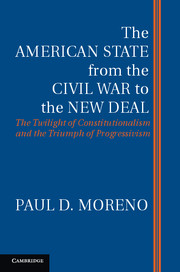 The American State from the Civil War to the New Deal
The American State from the Civil War to the New Deal Book contents
- Frontmatter
- Contents
- Abbreviations Used in the Footnotes
- Acknowledgments
- Introduction
- Part I The Old Regime
- Part II Early Progressivism
- 4 The New Jurisprudence
- 5 The Due Process Dialectic
- 6 Toward a Federal Police Power
- 7 Rooseveltian Progressivism
- 8 The Lochner Incident
- 9 Court and Constitution in Crisis
- 10 Taft and the Republican Crackup
- Part III Late Progressivism
- Part IV The New Deal
- Appendix A
- Appendix B
- Primary Sources
- Index
- References
9 - Court and Constitution in Crisis
Published online by Cambridge University Press: 05 May 2013
- Frontmatter
- Contents
- Abbreviations Used in the Footnotes
- Acknowledgments
- Introduction
- Part I The Old Regime
- Part II Early Progressivism
- 4 The New Jurisprudence
- 5 The Due Process Dialectic
- 6 Toward a Federal Police Power
- 7 Rooseveltian Progressivism
- 8 The Lochner Incident
- 9 Court and Constitution in Crisis
- 10 Taft and the Republican Crackup
- Part III Late Progressivism
- Part IV The New Deal
- Appendix A
- Appendix B
- Primary Sources
- Index
- References
Summary
Notwithstanding the exaggerated claims of the reactionary impact of federal and state court decisions, American courts did find themselves in the middle of an intense criticism of the American constitutional system. Attacks were wide-ranging, diffuse, and often contradictory, quite like the “progressive” movement of which they were a part. Various commentators identified the problem as the Constitution itself, judicial review, or particular judges and decisions. They recommended, in response, constitutional amendments, limitation of judicial power, or new judicial personnel. The issue of the Constitution and the Courts became an important element in the presidential campaign of 1912.
WALTER CLARK
Walter Clark, the “fighting judge” and Chief Justice of the North Carolina Supreme Court, launched a sustained critique of the early twentieth-century constitutional order. Clark came from the Antifederalist and Confederate traditions. His father owned 5,000 acres and 200 slaves before the war, and Clark entered the Confederate Army at the age of fifteen. He remained committed to the “lost cause” for the rest of his life. After the war, he expected the extinction of the emancipated race, and remained a paternalistic white supremacist when it unexpectedly survived. He condemned the industrial power of the post-war North. In Social Gospel and Bryanesque language, he claimed that if Christ returned today, “They who form great syndicates and trusts and rob the people . . . would be foremost among those who would crucify him.”
- Type
- Chapter
- Information
- The American State from the Civil War to the New DealThe Twilight of Constitutionalism and the Triumph of Progressivism, pp. 106 - 112Publisher: Cambridge University PressPrint publication year: 2013


